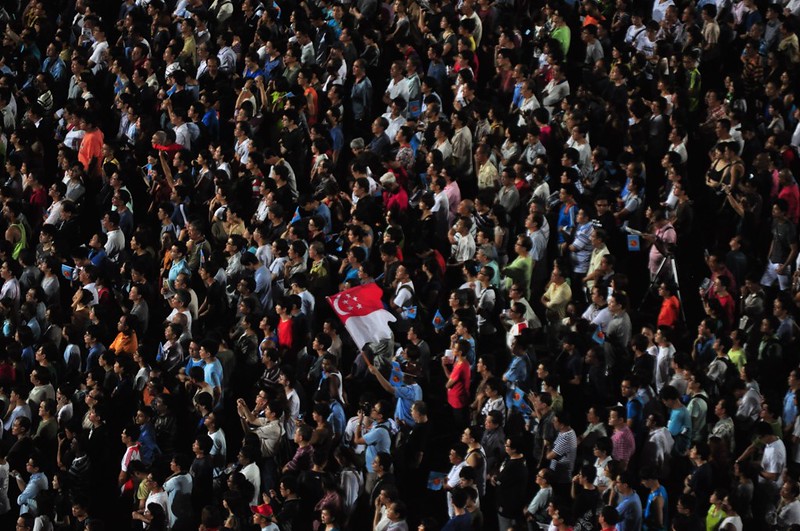Singapore’s real opposition emerges
Posted By Hoe-Yeong Loke on August 25, 2020 @ 11:00

Many general elections in Singapore have been described as ‘watersheds’. It’s become the euphemism every time the opposition makes gains. And so it was with the latest one on 10 July, but with one crucial difference—this watershed election was an unexpected one.
What explains this surprise jolt for the ruling People’s Action Party (PAP)? The virtual nature of the campaign, and the impact of young voters, played a large part. But underlying all this are signs of a real inflection point [1] for Singapore politics—the Workers’ Party (WP) has consolidated its position as the opposition to contend with, while the PAP’s ‘fourth generation’ (4G) leaders now find themselves on shaky ground.
The elections saw even greater Covid-19-related restrictions on physical campaigning than in the South Korean legislative assembly elections in April. This meant Singapore’s opposition was not able to hold rallies which, especially the WP’s, are some of the most boisterous and vibrant of any democracy.
Nevertheless, the opposition invested heavily in virtual outreach activities, as did the better-resourced PAP. Yet it was the WP that came across with clearer messaging, because it is a smaller, more tightly knit outfit than the behemoth that is the PAP. More potent perhaps was the spread of political messages on WhatsApp, although they were mainly satirical memes. TV political broadcasts were stepped up, but featured highly scripted speeches that made for drowsy evening viewing.
A virtual election also meant that the opposition’s campaign had been at the mercy of Protection from Online Falsehoods and Manipulation Act—the anti-fake news law that has been criticised for stifling online debate (the government’s position is that it ‘can only enhance public debate [2]’). Some parties were slapped with correction orders [3] under the act, including the Singapore Democratic Party for its criticism of the government’s handling of the pandemic.
While campaigning was virtual, voting was still a very manual process. Voters, accustomed to Singapore-style efficiency, faced long queues at polling stations because of Covid-19 screening measures. If swing voters indeed make up their minds in the last hour or so before casting their ballots, imagine the impact of an otherwise mundane problem [4]. Party insiders have shared anecdotal evidence that polling precincts with the longest queues delivered weaker results for the PAP.
The prevailing wisdom is that it was younger voters who swayed the election. The notion is that as digital natives, Generation Z voters have been exposed to a worldview that the PAP can never hope to control—more so now at a time of growing youth activism around the world, on issues ranging from climate change to identity politics.
In presenting the PAP’s election post-mortem, cabinet minister Lawrence Wong [5] disputed this reading, pointing instead to middle-aged voters, whom the PAP has vowed to win back. Wong clearly had the group constituency of Sengkang in mind, which the PAP lost in a shock defeat. Sengkang is a relatively new neighbourhood with many young families, more concerned about the loss of income and jobs than issues typically associated with youth activism.
K. Shanmugam, another cabinet minister, said [6] that younger Singaporeans now ‘must decide where to draw the boundaries on discussions on race and religion’—a significant change of tack in Singapore where racial and religious harmony is policed by strict laws. This could only be a nod to the incident where Raeesah Khan, the 26-year-old WP candidate for Sengkang, was castigated by the PAP [7] for her social media posts calling for racial justice. A police report was made against her. Some regard the episode as having backfired against the PAP and contributing towards its loss of Sengkang.
On the whole, the PAP’s 4G leaders look in danger of losing young voters, a trend that may have been accelerated by the virtual nature of the election. Lee Hsien Loong’s presumptive successor as prime minister was three percentage points away from losing his seat [8]. Amid a rare moment of vulnerability for the PAP, Lee has chosen to stick to his succession plan [9] as gleaned from the post-election cabinet reshuffle, calculating perhaps that the alternatives are even worse.
As a corollary, the WP was the real winner on election night because it had the youth and virtual factors going for it, and more. Even the most cynical of election watchers now see that the WP has been on a clear upward trajectory for some 15 years, punctuated only by a slightly disappointing showing in 2015.
The WP has been derided by some domestic and foreign observers as being ‘PAP-lite [10]’ for its moderate stances, calculated to win over middle-ground voters, but ultimately a token opposition presence. Such criticisms have been completely misguided. The ideological/policy gap between the PAP and the WP is not vastly different from that between most recent governments and oppositions in Australia or the UK, for instance.
Singapore’s other opposition parties are perennially blighted by structural weaknesses and infighting. They have not won any seats in three successive general elections. Any talk of a grand opposition coalition to face off the PAP is no longer taken seriously. It is time to recognise the WP as the real opposition to contend with, as Lee has [11].
Article printed from The Strategist: https://www.aspistrategist.org.au
URL to article: https://www.aspistrategist.org.au/singapores-real-opposition-emerges/
URLs in this post:
[1] inflection point: https://www.straitstimes.com/politics/recent-ge-showed-spore-at-inflexion-point-goh
[2] can only enhance public debate: https://www.channelnewsasia.com/news/singapore/singapore-pofma-online-falsehoods-law-scmp-bloomberg-12223282
[3] slapped with correction orders: https://www.todayonline.com/singapore/pofma-office-instructed-issue-correction-directions-cna-toc-nuss-and-new-naratif-over-paul
[4] imagine the impact of an otherwise mundane problem: https://www.straitstimes.com/politics/polling-day-pains-might-have-compounded-voter-frustration
[5] cabinet minister Lawrence Wong: https://www.todayonline.com/singapore/ge2020-middle-aged-voters-not-youths-accounted-national-vote-swing-against-pap-says
[6] said: https://www.straitstimes.com/politics/youth-must-decide-limits-of-race-and-religion-discussions-shanmugam
[7] castigated by the PAP: https://www.todayonline.com/singapore/ge2020-pap-calls-wp-make-clear-stand-raeesah-khans-social-media-posts
[8] three percentage points away from losing his seat: https://www.straitstimes.com/politics/ge2020-results-heng-swee-keats-pap-team-wins-east-coast-grc-against-wp-with-53-of-votes
[9] Lee has chosen to stick to his succession plan: https://www.straitstimes.com/singapore/4g-in-complete-unity-behind-heng-swee-keats-leadership-vivian-balakrishnan
[10] PAP-lite: https://www.straitstimes.com/politics/singapore-ge2020-workers-party-is-not-pap-lite-says-pritam-singh
[11] as Lee has: https://www.straitstimes.com/politics/wp-chief-to-be-named-leader-of-the-opposition
Click here to print.